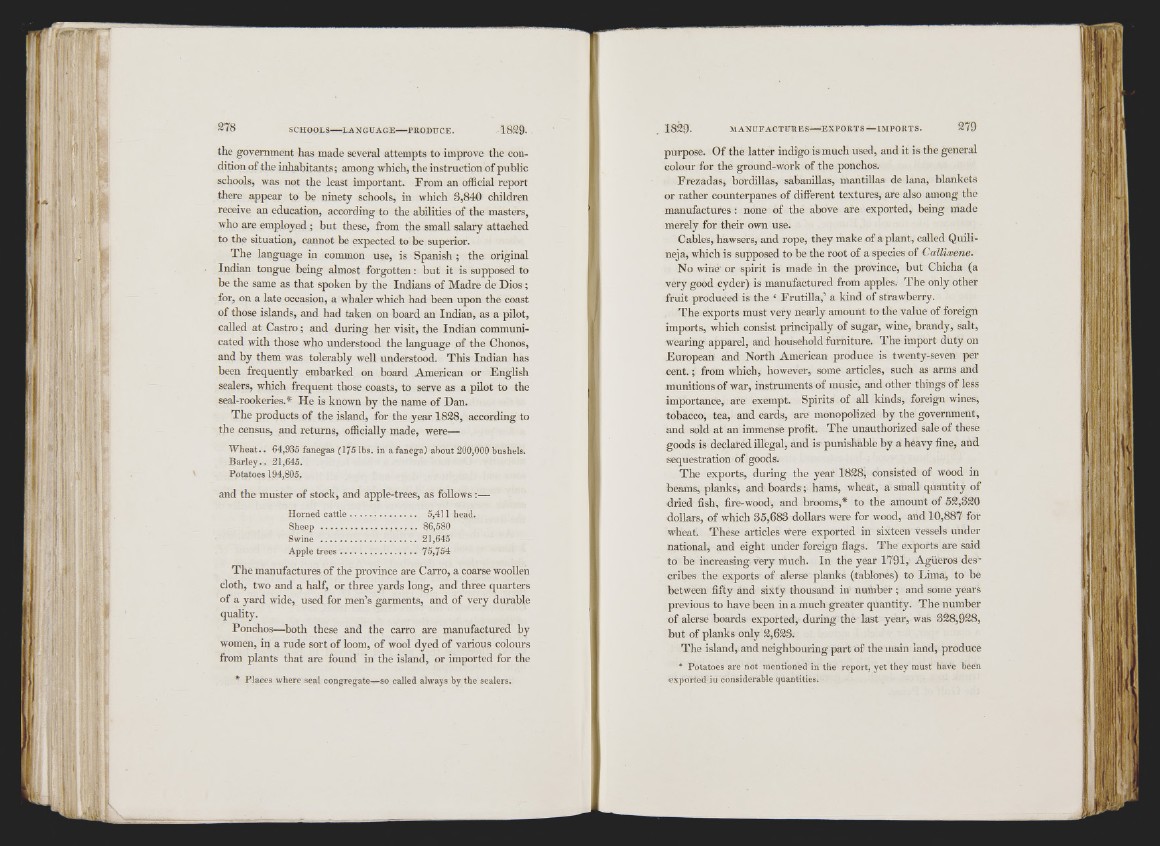
the government has made several attempts to improve the condition
of the inhabitants; among which, the instruction of public
schools, was not the least important. From an official report
there appear to be ninety schools, in which 3,840 children
receive an education, according to the abilities of the masters,
who are employed ; but these, from the small salai-y attached
to the situation, cannot be expected to be superior.
The language in common use, is Spanish ; the original
Indian tongue being almost forgotten: but it is supposed to
be the same as that spoken by the Indians of Madre de Dios ;
for, on a late occasion, a whaler which had been upon the coast
of those islands, and had taken on boai-d an Indian, as a pilot,
called at Castro; and during her visit, the Indian communicated
with those who understood the language of the Chonos,
and by them was tolerably well understood. Tliis Indian has
been frequently embarked on board American or Fnghsh
sealers, which frequent those coasts, to serve as a pilot to the
seal-rookeries.* He is known by the name of Dan.
The products of the island, for the year 1828, according to
the census, and returns, officially made, were—
W h e a t.. 64,935 fanegas (175 lbs. in a fanega) about 200,000 bushels.
B a r le y .. 21,645.
Potatoes 194,805.
and the muster of stock, and apple-trees, as follows :—
Horned c a ttle ............................... 5,411 head.
Sheep ............................................ 86,580
Swine ..............................................21,645
Apple tr e e s ................................... 75,754
The manufactures of the province are Carro, a coarse woollen
cloth, two and a half, or three yards long, and three quarters
of a yard wide, used for men’s garments, and of very durable
quality.
Ponchos—both these and the carro are manufactured by
women, in a rude sort of loom, of wool dyed of various colours
from plants that are found in the island, or imported for the
* Places where seal congregate—so called always by the sealers.
m
purpose. Of the latter indigo is much used, and it is the general
colour for the ground-work of the ponchos.
Frezadas, bordillas, sabanillas, mantillas de lana, blankets
or rather counterpanes of different textures, are also among the
manufactures : none of the above are exported, being made
merely for their own use.
Cables, hawsers, and rope, they make of a plant, called Quili-
neja, which is supposed to be the root of a species of Callixene.
No wine or spirit is made in the province, but Chicha (a
very good cyder) is manufactured from apples. The only other
fruit produced is the ‘ Frutilla,’ a kind of strawberry.
The exports must very nearly amount to the value of foreign
imports, which consist principally of sugar, wine, brandy, salt,
wearing apparel, and household ñirniture. The import duty on
European and North American produce is twenty-seven per
cent.; from which, however, some articles, such as arms and
munitions of war, instruments of music, and other things of less
importance, are exempt. Spirits of all kinds, foreign wines,
tobacco, tea, and cards, are monopolized by the government,
and sold at an immense profit. The unauthorized sale of these
goods is declared illegal, and is punishable by a heavy fine, and
sequestration of goods.
The exports, during the year 1828, consisted of wood in
beams, planks, and boards; hams, wheat, a small quantity of
dried fish, fire-wood, and brooms,* to the amount of 62,320
doUars, of which 35,683 dollars were for wood, and 10,887 for
wheat. These articles were exported in sixteen vessels under
national, and eight under foreign flags. The exports are said
to be increasing very much. In the year 1791, Agüeros describes
the exports of alerse planks (tablones) to Lima, to be
between fifty and sixty thousand in number ; and some years
previous to have been in a much greater quantity. The number
of alerse boards exported, during the last year, was 328,928,
but of planks only 2,623.
The island, and neighbouring part of the main land, produce
• Potatoes are not mentioned in the report, yet they must have been
€xported iu considerable quantities.
Í:
<1
Ili